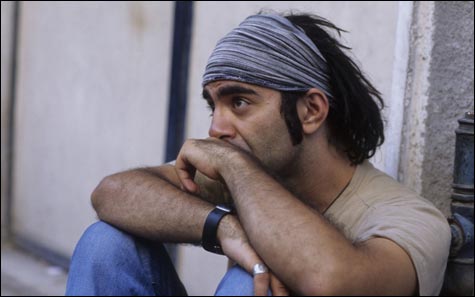
UNDISCOVERED COUNTRY: For Akin, it’s always what’s on the other side; for us, it might be Turkey. |
To judge from Wir haben vergessen zurückzukehren|We Forgot To Go Back (2001), Fatih Akin’s documentary about his parents’ repatriation from Turkey to Germany, his family had less trouble making the transition than, say, the average Latino or Muslim immigrant to the US today. Perhaps that’s why he doesn’t dwell on cultural differences in his films but uses them as a starting point to explore issues common to all.His breakthrough film, Gegen die Wand|Head On (2004), featured Turkish-German characters as protagonists, but their travails mirrored those of anyone constrained by society’s limitations. Auf der anderen Seite also draws on universal themes; it’s a multi-narrative look at freedom, love, death, and reconciliation. And so Akin wanted to make sure the film’s title in English would appeal to American viewers.
“Yeah. I chose it,” he says over the phone from the west coast of Turkey, where he’s vacationing. “I wanted to give the film its own identity for the commercial market. I didn’t like so much On the Other Side as a translation. It’s a very beautiful title in German, but when you translate it word for word, On the Other Side, it sounds like another German film, The Lives of Others [Das Leben der Anderen]. Also, I thought it lacked a certain poetry. I asked native English speakers, and we discovered The Edge of Heaven.”
Did he worry that it might sound like the name of an undiscovered Douglas Sirk film?
He laughs. “I consider that a compliment.”
Akin is used to having his films compared to those of other directors. Fassbinder is a name that comes up a lot in discussions of his career. That didn’t stop him from casting the German genius’s muse Hanna Schygulla to play a pivotal role in his new movie.
“I met her at a film festival in Zagreb. I fell in love with her. It [the film] was written for her. I wish I was older or she was younger and we could have a love affair or something like that.”
More elements for the film sprang from his experiences on the feature-film jury at Cannes 2005. The deliberate pace and long takes of such Asian films as Hou Hsiao-Hsien’s Three Times impressed him. He also befriended Guillermo Arriaga, screenwriter for Alejandro González Iñárritu’s 21 Grams and Babel, films whose multi-linear narrative structure resembles that of Auf der anderen Seite.
“So we have this modern form of narrative structure,” he explains. “But the way we would shoot the film . . . was inspired by Asian cinema. This makes the film more interesting, I think. On the one hand there’s the classical old-fashioned style, and you have the modern storytelling [devices], and you mix them together.”
Because of his growing success, many new projects, including one with an American studio, have come Akin’s way. But he’s determined to overcome his greatest challenge: making a comedy.
“The next film I’m working on will be very different from the last two. It’s called Soul Kitchen. Comedy is the hardest. I have been working for five years on that damn screenplay. I think it’s the most difficult film I ever worked on. You can make people cry. That’s so easy. You can make people cry in Japan or Great Britain, but humor is so much more difficult.”
And what of Turkey, the land to which his characters keep returning, often to a grim fate?
“Turkey is a unique country with unique issues. It’s a very strange country. I think you can look for good cinema coming from here. We have a lot of problems and so a lot of stories to tell.”